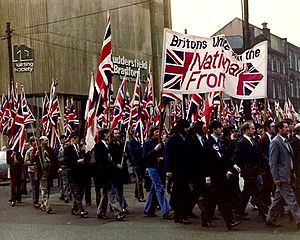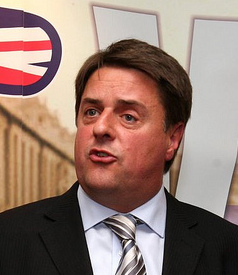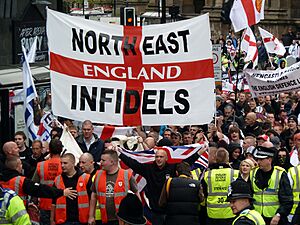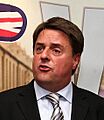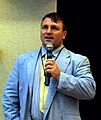National Front (UK) facts for kids
Quick facts for kids
National Front
|
|
|---|---|
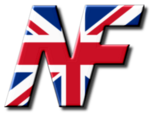 |
|
| Abbreviation | NF |
| Leader | Tony Martin |
| Deputy Leader | Jordan Pont |
| Founder | A. K. Chesterton |
| Founded | 7 February 1967 |
| Merger of |
|
| Ideology |
Internal factions:
|
| Political position | Far-right |
| National affiliation | Nationalist Alliance (2005-2008) |
The National Front (NF) is a political party in the United Kingdom. It is known for its extreme right-wing views. The party is currently led by Tony Martin.
The National Front has never had its members elected to the British or European Parliaments. However, a few of its members have become local councillors. The party was started in 1967. It was most popular in the mid-1970s, when it was briefly the fourth-largest party in England based on votes.
The NF was founded by A. K. Chesterton. He brought together his League of Empire Loyalists and the British National Party. Later, the Greater Britain Movement joined. Its leader, John Tyndall, became the NF's chairman in 1972.
Under Tyndall, the party grew by focusing on concerns about migration to Britain. Its membership and votes increased in areas like east London and northern England. The party held public marches and rallies. These often led to clashes with people who were against the National Front. Notable events included the 1974 Red Lion Square disorders and the 1977 Battle of Lewisham.
In 1982, Tyndall left the National Front to start a new British National Party (BNP). Many NF members followed him, which caused the National Front's support to drop a lot. In the 1980s, the NF split into two groups. One group, the Flag NF, kept the party's older ideas. The other, the Official NF, adopted a different view before it ended in 1990. In 1995, the Flag NF's leaders changed the party's name to the National Democrats. However, a small group continued to use the National Front name.
The National Front is considered an extreme right-wing party in British politics. Experts describe it as a fascist or neo-fascist group. Over time, different groups within the party have had their own ideas. These included groups with neo-Nazi or racial populist beliefs.
The party believes that only white people should be citizens of the United Kingdom. It wants to stop non-white people from moving to the UK. It also wants non-white Britons to lose their citizenship and be sent out of the country. The National Front promotes the idea that white people are superior. It supports the idea of global racial separation. It is against relationships between people of different races. The party also holds anti-Jewish views. It denies that the Holocaust happened. It claims that Jewish people control the world's finances and politics.
The National Front supports protecting local industries and businesses. It is against the European Union. It also wants to change Britain's democratic system. The party's social ideas are against feminism and LGBT rights.
After the BNP, the National Front has been the most successful extreme right-wing group in British politics since World War II. It has created smaller groups, like a trade union association and a youth group. Only white people are allowed to be members of the party. In its most popular period, most of its support came from white working-class people in northern England and east London. The National Front has always faced strong opposition from left-wing and anti-fascist groups. Its members are not allowed to work in certain jobs.
History of the National Front
How the Party Started: 1966–1967
The National Front began as a group of small, extreme right-wing parties in the 1960s. A. K. Chesterton, leader of the League of Empire Loyalists (LEL), wanted to unite them. He had been part of the British Union of Fascists (BUF) in the 1930s.
Many extreme right-wing figures met with Chesterton to discuss this idea. These included members from the British National Party (BNP) and the Greater Britain Movement (GBM). Uniting them was hard because of personal disagreements.
Chesterton agreed to merge the LEL and BNP. A part of the Racial Preservation Society also joined. They decided not to invite Tyndall's GBM at first because of its strong links to neo-Nazism.
In October 1966, the LEL and BNP formed a committee. They wanted to agree on shared policies. Their first ideas included being against Britain's political leaders and against communism. They also supported white minority governments in Rhodesia and South Africa. They wanted to ban migration to Britain and expel all non-white immigrants.
They chose the name "National Front" in December 1966. The National Front (NF) officially started on 7 February 1967. Chesterton was its first chairman. It had about 2,500 members. This included 1,000 from the BNP, 300 from the LEL, and over 100 from the RPS. Historians say the NF's creation was a very important event for extreme right-wing politics in Britain.
Early Growth and Challenges: 1968–1972
The NF's first year involved a power struggle between the former LEL and BNP groups. The LEL members did not like the BNP members' political chanting. The BNP group criticized Chesterton's leadership style. In June 1967, Tyndall ended the GBM and told its members to join the NF. Chesterton welcomed him, even though he had planned to keep Tyndall out. Tyndall's magazine, Spearhead, which used to promote neo-Nazism, changed its focus to support the NF. It became the party's main monthly magazine.
The party held its first yearly meeting in October 1967. People who were against fascism protested outside. In 1968, Andrew Fountaine tried to challenge Chesterton's leadership but failed and left the party. More arguments happened when their office lease in Westminster ended. Some members wanted a new office in central London. Others preferred moving to the GBM's old office in Tulse Hill. Chesterton supported the central London idea.
In April 1968, migration became a major topic in the news. This was after Conservative Party politician Enoch Powell gave his "Rivers of Blood speech". He spoke against non-white migration to Britain. While Powell suggested less extreme actions than the NF, his words were similar. Some right-wing Conservatives then joined the NF.
The NF had 45 candidates in the 1969 local elections. They received about 8% of the votes on average. In the 1970 local elections, they focused on these areas with 10 candidates. Most received less than 5% of the vote. The party faced strong opposition from left-wing groups. In 1969, a lorry was driven into their Tulse Hill building. To fight this, the NF put a spy in London's anti-fascist movement.
Against Chesterton's wishes, NF activists performed public stunts. In 1968, they marched onto a TV show uninvited. In 1969, they attacked two Labour Party ministers. While Chesterton was on holiday, a group led by Gordon Brown tried to take over his leadership. Chesterton resigned when he saw he had little support. John O'Brien became the new leader in February 1971. O'Brien and his supporters left the NF in June 1972. They were unhappy that Tyndall kept links with neo-Nazi groups.
Tyndall's First Time as Leader: 1972–1975
Tyndall became the party chairman in July 1972. He moved the NF's main activities to a new office in Croydon. Under Tyndall, the NF tried to turn people worried about migration into fascists. Historian Roger Eatwell noted that Tyndall tried to hide the NF's neo-Nazism from the public. He feared it would harm their support. The party started to focus on gaining support from white working-class people. In June 1974, it launched the NF Trade Unionists Association. Left-wing groups fought back by showing the public the neo-Nazi past of senior NF members. They shared photos of Tyndall wearing a Nazi uniform.
The NF gained many new members due to fears about Ugandan Asian refugees arriving in 1972. In the 1973 West Bromwich by-election, the party received 16% of the vote. This was the first time it got over 10% in a parliamentary election, leading to more media attention. The NF had 54 candidates in the February 1974 general election. This number meant they got a party political broadcast. They ran in six times more seats than in 1970. They averaged 3.2% of the vote, slightly less than in 1970.
By the mid-1970s, the NF's membership had stopped growing and even decreased in some areas. All 90 of its candidates for the October 1974 general election lost their deposits (money paid to run, which is returned if a candidate gets enough votes). In the 1975 local elections, they had only 60 candidates, much fewer than before.
A group called the "Populists" emerged in the party, led by Roy Painter. They were unhappy that former BNP and GBM members controlled the NF. They also believed Tyndall was still a neo-Nazi. They helped John Kingsley Read get elected as chairman, with Tyndall becoming vice-chair. Arguments grew between Tyndall's supporters and the Populists. Read and his committee suspended Tyndall and nine of his supporters. Then they expelled Tyndall from the party. Tyndall took the issue to court, and his expulsion was declared illegal. Frustrated, Read and his supporters left the NF to form the National Party (NP) in December 1975.
Tyndall's Second Time as Leader: 1976–1982
In February 1976, Tyndall became the NF leader again. The party then used public anger about the government accepting Malawian Asian refugees. They held protests against their arrival. After gaining more support in London during the 1977 GLC election, the party planned more marches in the city. One march through Lewisham in August 1977 led to clashes with anti-fascists. This event became known as the "Battle of Lewisham".
In the 1979 general election, the NF had more candidates than any new party since Labour in 1918. However, it performed poorly, getting only 1.3% of the total vote. This was down from 3.1% in the October 1974 general election. This drop might have been due to more anti-fascist campaigns. It could also be because the Conservatives, under Margaret Thatcher, took a tougher stance on migration. This attracted many votes that used to go to the NF. The NF's membership had also decreased.
Tyndall and Webster had been friends for a long time. But in the late 1970s, Tyndall started blaming Webster for the party's problems. Tyndall resigned in January 1980. In June, he started the New National Front (NNF). About a third of the NF's members left to join it.
Changes and Splits: 1983–1990
After Tyndall left, Andrew Brons became party chair. Webster remained as National Activities Organiser. In 1983, a group led by Nick Griffin and Joe Pearce removed Webster from all paid positions. This group, who followed a specific type of Nazism called "Strasserism," took control of the party in May 1985. They suspended their opponents' memberships. Their main goal was not to win elections. Instead, they wanted to build a group of dedicated activists, mostly young working-class people. These supporters became known as "Political Soldiers." The Strasserites officially changed their party structure in November 1986.
The Strasserites called themselves "radical, youthful and successful." They compared their approach to the "out-dated conservative policies" of their opponents. These opponents then formed a rival group, the Flag Group. They used the name "National Front" in January 1987. According to Eatwell, the Flag NF continued the party's earlier focus on racial populism. It had more working-class leaders than the Strasserite group. They saw the Strasserites as intellectuals with foreign ideas. There were two groups claiming the name National Front until 1990. One was controlled by the Flag Group, and the other was the Strasserites' Official National Front. The Flag Group allowed its local branches more freedom. It focused on local issues. Both groups had mostly stopped trying to win elections after the NF's votes dropped in the late 1970s.
The Strasserite Official NF supported "a broad front of racialists of all colours." These groups wanted to end multi-racial society and capitalism. They praised black nationalists like Louis Farrakhan and Marcus Garvey. Their publication, Nationalism Today, had positive articles about the Libyan and Iranian governments. It presented them as part of a global anti-capitalist and anti-Marxist force. This new way of thinking made many NF members leave. The Official NF had internal problems. In 1989, Griffin, Derek Holland, and Colin Todd left to start the International Third Position. In March 1990, the Official NF was ended by its leaders. They replaced it with a new group, the Third Way. This left the Flag Group as the only party using the National Front name.
Further Decline: 1990–Present
In the 1990s, Tyndall's new British National Party (BNP) became Britain's main extreme right-wing movement. It overshadowed the NF. After a football riot in 1995, the NF's chairman Ian Anderson tried to change the party's negative image. He renamed it the National Democrats. A small group broke away to keep the National Front name. They ran in the 1997 and 2001 general elections, but had little success. By 2001, the NF had strong ties with Combat 18, a neo-Nazi group. The Front continued to organize rallies, but several were banned by government officials.
A court ruling in 2010 forced the BNP to remove a rule that prevented non-white people from joining. This led some members to leave the BNP and join the NF. After the English Defence League (EDL), an anti-Islam group, appeared in 2009, the NF tried to work with them. However, the EDL refused, wanting to distance itself from the NF and other older extreme right-wing groups. As the EDL declined, the NF worked with some groups that had split from it. These included the North West Infidels and South East Alliance. In March 2015, Kevin Bryan became the NF's chairman. After he was injured, Dave MacDonald took over in November 2015. Tony Martin became chairman in September 2018.
National Front Election Results
The National Front had its most success between 1972 and 1977. By the late 1970s, the party's support had greatly decreased. In the 1980s, it mostly stopped taking part in elections. The NF becoming an electoral force in the 1970s was a new event in British politics. It was the first time an extreme right-wing party gained so many votes.
General and By-Elections
The National Front never won a seat in the House of Commons. In the 1970 general election, the NF had ten candidates. They averaged 3.6% of the vote in those areas. It did better in later by-elections. In the 1972 Uxbridge by-election, it received 8.2% of the vote. In the 1973 West Bromwich by-election, it received 16%. This was the first time the party saved its electoral deposit.
In the February 1974 election, 54 of its candidates averaged 3.3% of the vote. In the October 1974 election, 90 candidates averaged 3.1%. In the October 1974 general election, the Front gained over twenty-five times more votes than the BUF had ever gained. This suggested that extreme right-wing politics was stronger in 1970s Britain than in 1930s Britain.
| Year | Number of candidates | Total votes | Average voters per candidate | Percentage of vote | Saved deposits | Change (percentage points) | Number of MPs |
|---|---|---|---|---|---|---|---|
| 1970 | 10 | 11,449 | 1,145 | 0.04 | 0 | N/A | 0 |
| Feb 1974 | 54 | 76,865 | 1,423 | 0.2 | 0 | +0.16 | 0 |
| Oct 1974 | 90 | 113,843 | 1,265 | 0.4 | 0 | +0.2 | 0 |
| 1979 | 303 | 191,719 | 633 | 0.6 | 0 | +0.2 | 0 |
| 1983 | 60 | 27,065 | 451 | 0.1 | 0 | −0.5 | 0 |
| 1987 | 1 | 286 | 286 | 0.0 | 0 | −0.1 | 0 |
| 1992 | 14 | 4,816 | 344 | 0.1 | 0 | +0.1 | 0 |
| 1997 | 6 | 2,716 | 452 | 0.0 | 0 | −0.1 | 0 |
| 2001 | 5 | 2,484 | 497 | 0.0 | 0 | 0.0 | 0 |
| 2005 | 13 | 8,029 | 617 | 0.0 | 0 | 0.0 | 0 |
| 2010 | 17 | 10,784 | 634 | 0.0 | 0 | 0.0 | 0 |
| 2015 | 7 | 1,114 | 159 | 0.0 | 0 | 0.0 | 0 |
In 1977, the NF ran in three by-elections. They gained 5.2% of the vote in the City of London and Westminster South by-election. They got 8.2% in the Birmingham Stechford by-election and 3.8% in the Ashfield by-election. In the Birmingham Stechford by-election, and later in Birmingham Ladywood in 1977 and Lambeth Central in 1978, it beat the Liberal party to come in third place.
Within a few years, the NF's election support dropped a lot. In the 1979 general election, it had 303 candidates. They averaged 0.6% of the total national vote. They lost £45,000 in deposits. In the areas they ran, they averaged 1.3% of the vote. This number rose to 2% in the 88 areas they ran in Greater London. This election "marked the beginning of the end" of the party trying to gain power through elections. In the 1983 general election, the NF ran in 54 areas, averaging 1% in each.
EU Parliament Elections
| Year | Candidates | MEPs | Percentage vote | Total votes | Change | Average vote |
|---|---|---|---|---|---|---|
| 1989 | 1 | 0 | 0.0 | 1,471 | N/A | 1471 |
| 1994 | 5 | 0 | 0.1 | 12,469 | +0.1 | 2494 |
Local Elections
The NF did better in local elections than in general ones. However, it never won a local council seat. In October 1969, two Conservative councillors in Wandsworth London Borough Council joined the Front. But they returned to the Conservatives in December. In the May 1974 London council elections, the party averaged 10% of the vote in several boroughs. Its best result was in Hounslow.
In the April 1976 council elections, the NF increased its votes in many towns. It got 21% of the vote in Sandwell, 20.7% in Wolverhampton, 18.54% in Leicester, and 17% in Watford.
The NF gained support in the 1977 Greater London Council elections. It ran in almost every seat. Its 91 candidates got 120,000 votes. This was more than double the party's total votes in all of England in 1974. In Inner London, it got the third-largest share of votes. Its share of the London vote also increased. It averaged over 10% of the vote in three boroughs: Hackney, Newham, and Tower Hamlets.
The NF's election support started to slow down in the local elections of 1977 and 1978. By 1977, the party's election support had reached its highest point. By the London Borough Council elections of 1978, its support had clearly decreased in the city. This was then seen in local elections across the UK.
In 2010, the NF gained its first elected representative in 35 years. John Gamble, a local councillor in Rotherham Metropolitan Borough Council, joined the NF. He had been elected as a member of the England First Party. In 2011, he was removed for not attending meetings for six months.
Parish and Community Councils
The NF gained a few representatives on parish councils and community councils. In 2010, Sam Clayton, a representative for Bilton and Ainsty with Bickerton Ward in Harrogate, joined the NF. He had been elected without opposition as a BNP candidate in 2008. By 2011, he was no longer on the council. In 2011, the NF gained a representative on Langley Parish Council in Derbyshire. Timothy Knowles was elected without opposition. He was removed from the council several months later for not attending meetings. In October 2015, the NF chairman David MacDonald was elected to Garthdee Community Council in Aberdeen with 18 votes.
Images for kids
See also
 In Spanish: Frente Nacional (Gran Bretaña) para niños
In Spanish: Frente Nacional (Gran Bretaña) para niños
 | Leon Lynch |
 | Milton P. Webster |
 | Ferdinand Smith |


